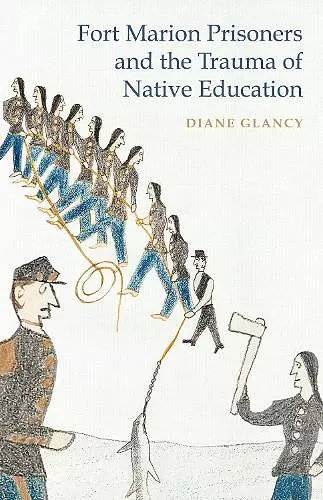Fort Marion Prisoners and the Trauma of Native Education
Format:Paperback
Publisher:University of Nebraska Press
Published:1st Nov '14
Currently unavailable, and unfortunately no date known when it will be back

At the end of the Southern Plains Indian wars in 1875, the War Department shipped seventy-two Kiowa, Cheyenne, Arapaho, Comanche, and Caddo prisoners from Fort Sill, Oklahoma, to Fort Marion in St. Augustine, Florida. These most resistant Native people, referred to as “trouble causers,” arrived to curious, boisterous crowds eager to see the Indian warriors they knew only from imagination. Fort Marion Prisoners and the Trauma of Native Education is an evocative work of creative nonfiction, weaving together history, oral traditions, and personal experience to tell the story of these Indian prisoners.
Resurrecting the voices and experiences of the prisoners who underwent a painful regimen of assimilation, Diane Glancy’s work is part history, part documentation of personal accounts, and a search for imaginative openings into the lives of the prisoners who left few of their own records other than carvings in their cellblocks and the famous ledger books. They learned English, mathematics, geography, civics, and penmanship with the knowledge that acquiring the same education as those in the U.S. government would be their best tool for petitioning for freedom. Glancy reveals stories of survival and an intimate understanding of the Fort Marion prisoners’ predicament.
"Glancy is not only an insightful historian but a gifted storyteller. The craft, creativity, and imagination with which she renders this amazing text powerfully draw the reader into the world of the Fort Marion prisoners. Few texts to date have portrayed their experiences with the upheavals of a changing world with such intimacy and humanism."—Steven Williams, American Studies
"A memorable book. Intuitively and perceptively connecting the difficult journeys of late nineteenth-century Southern Plains Indians and her own difficult journeys more than one hundred years later, Glancy gives us valuable, evocative ways of imagining the Great Plains and its peoples in motion, undertaking often painful and traumatic journeys to understand who they are, where they have been, and where they might be going."—Eric Gary Anderson, Great Plains Quarterly
“Diane Glancy inhabits a world of images that breathe life and voice for the voiceless men, women, and children. . . . No simple history lesson, this, as Glancy examines how language is both captor and savior, another means of imprisonment and also liberation.”—Gina Ochsner, author of The Necessary Grace to Fall
“This book is mesmerizing and will stay with you for lifetimes.”—Jackie Old Coyote, Apsaalooke Nation, former director of education and outreach at the Harvard Project on American Indian Economic Development
“The survival of Indian people represents one of the most important subjects in American history. Glancy creates a multilayered narrative about the Kiowa, Cheyenne, Comanche, and Arapaho Indians, who became prisoners of the United States government during the late nineteenth century. She invites readers to contemplate the bleak realities and the difficult choices presented by historical circumstances.”—Brad Lookingbill, professor of history at Columbia College of Missouri
ISBN: 9780803249677
Dimensions: unknown
Weight: unknown
136 pages